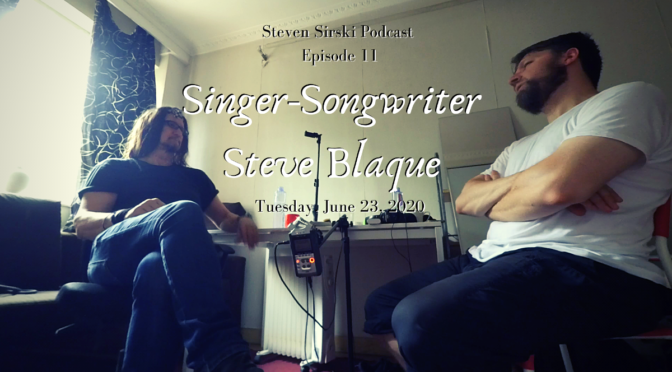Recorded on Tuesday, June 23, 2020 at Forbidden City Studios in Beijing, China.
This week’s episode features my first guest! Former colleague and good friend Steve Blaque has been in China for nearly 20 years. A singer songwriter and recently and now retired, he agreed to sit down with me for a rather lengthy conversation about music and life in China.
This conversation went on a lot longer than both of us expected but, instead of cutting it down, I’ve left just about all of it in and made notes of key points throughout the interview so you can skip through the parts you’re not interested in. Parts of the conversation get really technical about music production so it’s understandable if some people want to skip past those parts but I leave it in because I know a few people who would’ve loved to have the opportunity to sit down and hear how this guy works as a musician.
The interview can be broken into two main parts: music and audio production and life in China.
Music & audio production
1.00 – Why am I doing a podcast, learning Logic Pro X and other audio post-production including, plugins, levels
8.35 – Using automated musicians in song writing, Logic Pro, Garageband, TuneTracks, EZdrummer, Scaler2
17.51 – working with other musicians
21.45 – Working with technology and personal breakdowns
25.00 – Finding musicians to work with
27.08 – The difference between automated musicians and real musicians and revealing your own mistakes
30.50 – Being a “professional” and musical
34.10 – Sampling and mixing
35.27 – Building a home studio while living abroad
38.42 – Devote time to learning your tools
39.57 – Live streaming and frequent publishing, playing shows in China, using OBS live streaming
45.14 – Calling tech support and solving problems in the studio
48.50 – Being enraptured with the technology and having a sound engineer in the band, and perfectionism – just get it out there!
53.10 – Steve hears his song “Dust” on the radio and hears what could’ve been done differently
54.53 – The emotion is most important, the technology is secondary; self-criticism never stops
56.21 – “You gotta listen to this loud!”; what level do you mix at?
1.02.14 – “I lost hearing in my right ear” and the 2008 Yunnan earthquake
1.06.22 – Working with gain levels in the mix, floating bit audio, distortion and clipping isn’t the same as in the analogue days, mixing with channel strips set to between -18 and -12 dB
1.17.45 – Order of effects on a channel strip; EQ and compression – are they necessary? Using reverb. How many plugins / effects do you need?
1.24.33 – Resurgence of Steve’s musical career in 2014
1.28.00 – Music before 2014, getting control of vocals
1.29.45 – Difficult to explain what I do, better at learning and doing rather than teaching the process
1.31.52 – Early management career, fear of not being good enough, letting go of things in 1994
1.33.08 – Touring Australia with a band
1.36.12 – Holding down the solo guitar spot and how to play a solo
1.42.05 – Music licensing
1.45.15 – Playing cover songs and learning from what’s already been done
1.48.10 – What the audience expects and does it matter? What music means to them and to the performer. Being faithful to the song while still being creative.
1.53.50 – Knowing the “standards” or musical dictionary; learning how to play guitar
1.59.10 – Programming cymbals on a computer or iPad; quantizing drum beats – “It’s like going to a party with a hot date…”
2.03.18 – Typical songwriting process and releasing an album
2.06.23 – Other ventures, merchandise, audiobooks, Ableton audio packs
2.08.48 – The studio in Tasmania and HOW MANY GUITARS?!
China
2.14.09 – Learning Chinese, especially speaking and listening
2.17.35 – Why Steve came to China, other travels, but China was the only country Steve actually “moved” to
2.22.39 – Staying in China
2.23.44 – How many people live abroad for an extended period of time? Being an expat for so long.
2.25.00 – What Steve misses and doesn’t miss about Australia and living abroad; meeting women; sense of nationalism
2.27.52 – Would’ve stayed longer in China but the situation doesn’t allow it; getting visas
2.30.01 – Doing work for free; buying what’s needed that can be used in the future
2.31.45 – What has changed in China since Steve first arrived? The Olympics in 2008 but the big change happened in 2011
2.35.45 – How big is Beijing? And why is it so busy all the time?
2.37.17 – The “old world” of China, and Beijing, is gone. Difference between Beijing and Shanghai
2.39.50 – Beijing’s hutongs and the modification of the city
2.42.57 – Changes since 2015, the city is no longer what it was once like; the old “Beijing way of life” is pretty much gone; leading up to the 2022 Olympics
2.44.50 – Rise of the middle class
2.46.22 – Beijing’s two seasons
Links to Steve’s work:
- https://steveblaque.bandcamp.com/ – albums
- https://www.steveblaque.com/ – website
- https://twitter.com/darktrunk – Twitter
- https://www.darktrunk.com/ – Darktrunk Studios
